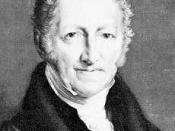A short thesis paper on the population problem Well writeen, excellent arguments and evidence. Good use of statistics.
Two hundred years ago, Thomas Malthus, in An Essay on the Principle of Population, reached the conclusion that the number of people in the world will increase exponentially, while the ability to feed these people will only increase arithmetically (21). Current evidence shows that this theory may not be far from the truth. For example, between 1950 and 1984, the total amount of grain produced more than doubled, much more than the increase in population in those 34 years. More recently though, these statistics have become reversed. From 1950 to 1984, the amount of grain increased at 3 percent annually. Yet, from 1984 to 1993, grain production had grown at barely 1 percent per year, a decrease in grain production per person of 12 percent (Brown 31).
Also strengthening to Malthus' argument is the theory that the world population will increase to over 10 billion by 2050, two times what it was in 1990 (Bongaarts 36).
Demographers predict that 2.8 billion people were added to the world population between 1950 and 1990, an average of 70,000 a year. Between 1990 and 2030, it is estimated that another 3.6 billion will be added, an average of 90,000 a year (Brown 31). Moreover, in the 18th century, the world population growth was 0.34%; it increased to 0.54% in the 19th century and in the first half of the 20th century to 0.84% (Weiskel 40).
Neo-Malthusians base their arguments on the teachings of Thomas Malthus. Of the Neo-Malthusians, Garrett Hardin is one of the most prominent and controversial. Hardin's essays discuss the problem of overpopulation and the effects it will have on the future. In Lifeboat Ethics, he concludes that continuous increases...



Very good paper
Well coordinated paper, lots of good information.
3 out of 3 people found this comment useful.